|
|
|
Sort Order |
|
|
|
Items / Page
|
|
|
|
|
|
|
| Srl | Item |
| 1 |
ID:
190829
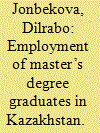

|
|
|
|
|
| Summary/Abstract |
This article explores the employment experiences of government scholarship graduates from one master’s degree programme at a flagship university in Kazakhstan. Analysis of interviews with graduates of a master’s degree programme designed in response to a national policy agenda shows that graduates encountered numerous challenges transitioning from university to work despite obtaining a degree from a top Kazakhstani university. The key challenges included limited employment opportunities, hostile attitudes toward younger graduates, difficult working conditions and employers’ misunderstanding of the new master’s programmes. We argue that despite significant government financial investment in education, a weak enabling support system hinders graduates’ career advancement and results in job mismatch and underutilization of skills. We suggest that policymakers need to shift debates on human capital development and graduate employability from supply-side factors to a more comprehensive model in which graduate employment is supported through the collaboration of the higher education system, industry, policymakers and graduates themselves.
|
|
|
|
|
|
|
|
|
|
|
|
|
|
|
|
| 2 |
ID:
190824
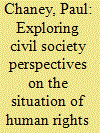

|
|
|
|
|
| Summary/Abstract |
This first pan-regional analysis of civil society organizations’ perspectives on the contemporary situation of human rights defenders (HRDs) in the Commonwealth of Independent States uses United Nations’ Universal Periodic Review (UPR) data and reveals a shrinking civil space as HRDs face a raft of rights pathologies, including threats, violence and murder. Their work is curtailed by increasing state restrictions on freedom of association and expression. The analysis reveals how women HRDs are particularly subject to discrimination and gender-based oppression. The malaise is compounded by impunity for offenders, corruption and government inaction following earlier UPR recommendations. The findings are theorized with reference to Weissbrodt’s causal typology and Hollyer and Rosendorf’s model of authoritarian government treaty accession.
|
|
|
|
|
|
|
|
|
|
|
|
|
|
|
|
| 3 |
ID:
190822
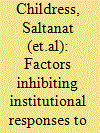

|
|
|
|
|
| Summary/Abstract |
The study identifies factors that limit effective institutional responses to domestic violence (DV) in Kyrgyzstan, in the context of recent legislative actions aimed at reducing DV through improvements in law enforcement, judicial processes and provision of social services. The study uses qualitative, grounded theory methods to analyse interviews and focus groups with 83 professionals working in these sectors. Two major themes emerge from the analysis: (1) barriers to effective institutional responses from internal challenges and constraints; and (2) social resources and challenges identified as important to provide a better collective response. The study highlights the need for capacity development within institutions and broader social learning to overcome existing barriers and better align outcomes with the intentions of recent legislation. Standardized training, awareness-raising, enhanced roles for educators and religious leaders, better coordinated social service provision, rehabilitation for victims and perpetrators, and family-centred school-based interventions are identified as targets for improving responsiveness.
|
|
|
|
|
|
|
|
|
|
|
|
|
|
|
|
| 4 |
ID:
190821
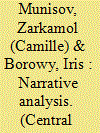

|
|
|
|
|
| Summary/Abstract |
This study examines contemporary poems on the Aral Sea crisis. Labelling them Russophone, the authors argue that the Russian language holds its status of lingua franca for the poets concerned about the environmental disaster in Central Asia. In these poems, the Aral Sea has become a central metaphor for the catastrophe that transcends the original case. The depiction of the diverse environmental issues caused by expanded irrigation policies in Soviet Central Asia provides favourable conditions to study these verses primarily from an ecopoetic perspective. Though these poems address one problem, the narrative form remains diverse: some authors apply various images; others personify the Aral Sea. In these verses the desert image acquires an unorthodox interpretation, while the personification of the Aral Sea in the poems reinforces the prior ecopoetry studies. This article investigates the poems’ content, historical background and anthropogenic effects on nature that pushed their authors to write them.
|
|
|
|
|
|
|
|
|
|
|
|
|
|
|
|
| 5 |
ID:
190827


|
|
|
|
|
| Summary/Abstract |
After the fall of the USSR, the newly established republics had to finish negotiating the bilateral border issue with China. These states chose to have the talks as a joint delegation of post-Soviet states. They also each experienced pressure from domestic constituencies. Viewing the entire negotiation process as a three-level game, the paper argues that in all four post-Soviet states the national governments believed the cost of ‘no agreement’ with China on the border issue to be so high that they chose to risk dealing with complex issues at home over passing up the opportunity to settle the border with their strongest neighbour. They did so with little regard for domestic opposition or the restrictions posed by the previous commitments on the supranational level.
|
|
|
|
|
|
|
|
|
|
|
|
|
|
|
|
| 6 |
ID:
190828
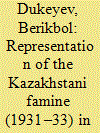

|
|
|
|
|
| Summary/Abstract |
This paper studies the role of textbook authors when portraying the Kazakhstani famine of 1931–33 in textbooks printed between 1992 and 2021 for the secondary school subject ‘The History of Kazakhstan’. Drawing on a multilayered and inter-discursive analysis of seven of these textbooks, and after 10 interviews with curriculum developers and textbook authors, this paper argues that authorship agencies have reflected a level of ambivalence: on the cause(s) of the famine; on their evaluation of it as a tragedy or as a genocide; on the identification of the perpetrators and victims; and the people’s revolt against the collectivization. The textbook authors have echoed the narratives from the cautious approach to the famine’s commemoration portrayed in state-led nation-building, to those in Kazakh nationalist narratives and the academic history. The results of this paper oppose the general assumption that textbook narratives are merely constructed from ‘above’ in a non-democratic state such as Kazakhstan.
|
|
|
|
|
|
|
|
|
|
|
|
|
|
|
|
| 7 |
ID:
190826
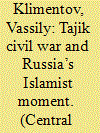

|
|
|
|
|
| Summary/Abstract |
Contra the often-held assumption that the Islamist danger has been at the forefront of Moscow’s security agenda since the Soviet–Afghan War, this article shows how different Russian decision-makers held different views of Islamism during the Tajik Civil War (1992–97). It argues that different relations to the Soviet past, especially to the Soviet–Afghan War, explain the differences in assessing Islamism in Tajikistan between the security agencies and political elites. Unlike the reformers in the Kremlin, the legacy Soviet security elites and diplomats in Russia and the neo-communist leaders in Central Asia recalled the Islamist danger from Soviet times. They emphasized it to the Kremlin who came to embrace their view as the Tajik Civil War progressed and tensions rose in Chechnya.
|
|
|
|
|
|
|
|
|
|
|
|
|
|
|
|
| 8 |
ID:
190823
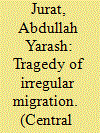

|
|
|
|
|
| Summary/Abstract |
This paper analyses irregular Afghan migrants in Turkey based on a qualitative field research study conducted in the cities of Ankara, Bursa, Malatya, Kayseri and Istanbul (see Note 1 on use of the term ‘Afghan’). It focuses on their migration journey, the factors driving migration and post-migration challenges. This research seeks to answer why Afghan irregular migrants are mainly male adults and how the employers in Turkey treat them. Afghan migrants in Turkey are mainly unskilled members of the labour force, typically working in construction, in supermarkets, as shepherds and in kitchens. This study argues that Afghan migration motives are mainly driven by humanitarian and economic deprivation. However, when they arrive in Turkey, migrants have no legal protection and are thrown into despair by their employers’ mistreatment.
|
|
|
|
|
|
|
|
|
|
|
|
|
|
|
|
| 9 |
ID:
190820
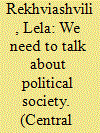

|
|
|
|
|
| Summary/Abstract |
This article points out the need to talk about the political society, or the politics and resistances, of subaltern groups in Eastern Europe and Eurasia. Existing literature frames diversity marginalized struggles as civil society struggles or decries the weakness of donor-driven, disembedded civil societies, reproducing the understanding of political life in the region in terms of absences, voids and deficiencies. Challenging this subsumption or dismissal of subaltern struggles, I advance two arguments. First, I argue against broadening the civil society concept to include various subaltern struggles as this approach risks overwriting differences between those groups that mobilize as rights-bearing citizens and the ones that are not recognized or treated as civil society. Instead, I propose acknowledging the historically and spatially contingent character of civil society and the defining role of the state and other actors in shaping which struggles fall within or beyond institutional and discursive frameworks of legality and legitimacy. Second, I argue that Patra Chatterjee’s concept of ‘political society’ can serve better as a meta-vocabulary to account for a diversity of struggles shunted as backwards, premodern and uncivilized, and to refocus research from what is absent to what is present, towards understanding counter-hegemonic discourses and practices.
|
|
|
|
|
|
|
|
|
|
|
|
|
|
|
|
| 10 |
ID:
190825
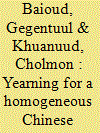

|
|
|
|
|
| Summary/Abstract |
This study examines the digital propaganda campaigns carried out by the Chinese Communist Party in Inner Mongolia following Mongols’ protest against the bilingual education reform in 2020. It analyses texts and images posted on WeChat official accounts of the Inner Mongolia Daily and Inner Mongolia Education Department. Through a detailed discourse and semiotic analyses of propaganda texts we reveal that the national unity and development discourses are replete with Han-centric assimilationist ideology. In our analysis, by drawing on a Bakhtinian chronotope, we foreground how the past, present and future are turned into a unified folkloric-cum-colonial space–time. This study also elucidates how the drastic policy shift and the re-articulation of national form in China is reflected in publicly circulated words and images in Inner Mongolia.
|
|
|
|
|
|
|
|
|
|
|
|
|
|
|
|
|
|
|
|
|